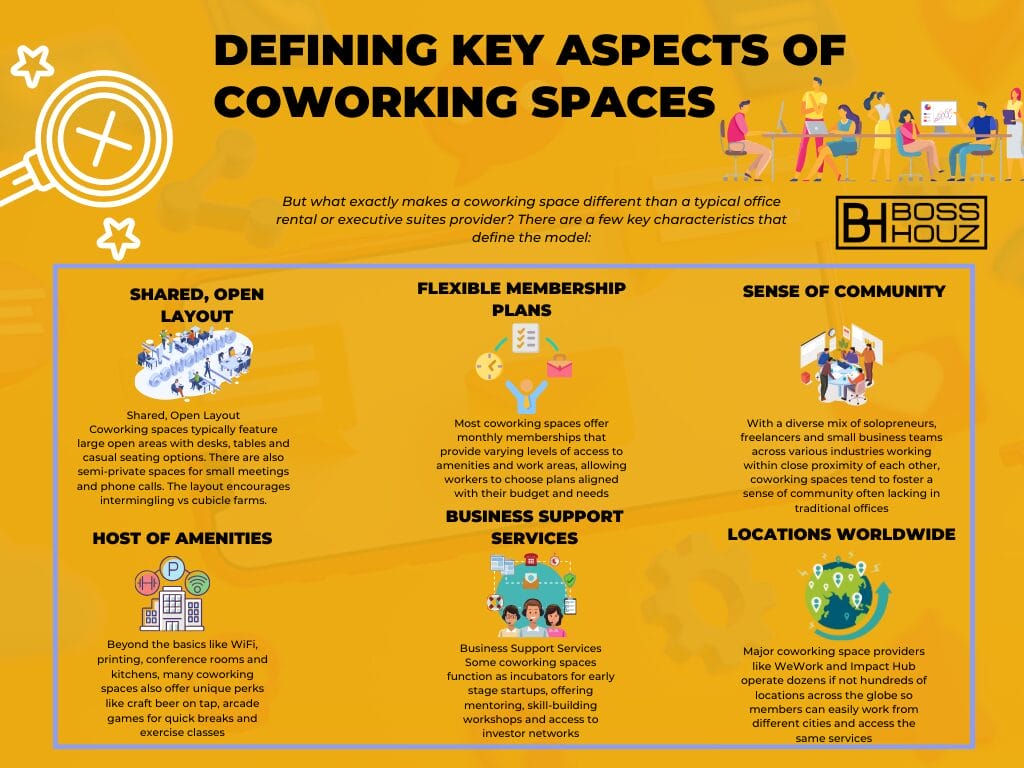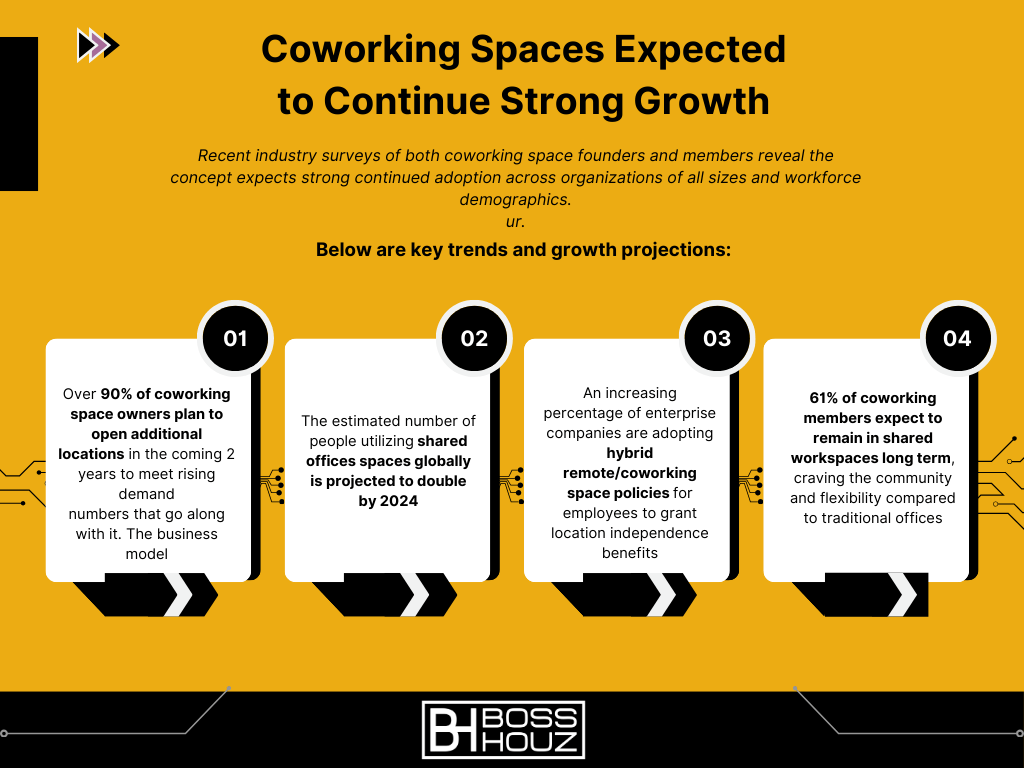It’s Monday morning as Amy walks into the sleek, modern coworking space she’s been a member of for the past 6 months. As she grabs an iced coffee from the kitchen and settles into her desk, she opens her laptop and takes in the buzz of activity around her. Software developers debating algorithms in one corner, graphic designers reviewing website mockups in another.
Amy runs a boutique PR agency specialising in tech startups. She loves the flexibility coworking spaces offer – she can come and go as she pleases, meet clients in the various reservable conference rooms, and tap into the community of other location independent freelancers, entrepreneurs, and remote workers that form connections organically in these shared office environments.
Coworking is part of a larger trend that has seen the business world shift increasingly towards flexibility, collaboration and an improved work-life balance.
But is it right for everyone? Here we explore the top 5 pros and cons of coworking spaces so you can determine if this new way of working suits your needs:
Table of Contents
A Brief History of Coworking Spaces
The concept of coworking spaces first originated in San Francisco in 2005, pioneering a new kind of workspace sharing model that would soon spread like wildfire.
The goal was simple – provide an alternative to working from home or renting traditional office space for independent workers and startups who were feeling isolated and unproductive.
“The access to amenities, sense of community, and opportunities for collaboration make coworking an appealing option for today’s workforce”
Brad Neuberg, coding bootcamp owner and freelancer, decided to open up his 500 sq ft office space for others to use when he wasn’t using it himself. He called it the “Spiral Muse” and didn’t charge set fees, instead suggesting contributions based on how much members valued the space.
Soon techies, designers, writers and entrepreneurs were flocking to Neuberg’s San Francisco apartment to work shoulder-to-shoulder with like-minded people in a collaborative environment that fostered creativity, knowledge sharing and meaningful connections.
Fast forward 15 years later and an estimated 1.7 million people globally now work in roughly 19,000 coworking spaces in cities from Singapore to Stockholm, making it one of the fastest growing trends in commercial real estate and remote work culture.
Defining Key Aspects of Coworking Spaces


But what exactly makes a coworking space different than a typical office rental or executive suites provider? There are a few key characteristics that define the model:
Shared, Open Layout
Coworking spaces typically feature large open areas with desks, tables and casual seating options. There are also semi-private spaces for small meetings and phone calls. The layout encourages intermingling vs cubicle farms.
Flexible Membership Plans
Most coworking spaces offer monthly memberships that provide varying levels of access to amenities and work areas, allowing workers to choose plans aligned with their budget and needs
Sense of Community
With a diverse mix of solopreneurs, freelancers and small business teams across various industries working within close proximity of each other, coworking spaces tend to foster a sense of community often lacking in traditional offices
Host of Amenities
Beyond the basics like WiFi, printing, conference rooms and kitchens, many coworking spaces also offer unique perks like craft beer on tap, arcade games for quick breaks and exercise classes
Business Support Services
Some coworking spaces function as incubators for early stage startups, offering mentoring, skill-building workshops and access to investor networks
Locations Worldwide
Major coworking space providers like WeWork and Impact Hub operate dozens if not hundreds of locations across the globe so members can easily work from different cities and access the same services
Now that we’ve defined what coworking spaces are, let’s explore the key pros and cons to see if utilizing one makes sense for your work style and situation.
The Top 5 Pros of Coworking Spaces
For solopreneurs, freelancers and location independent teams alike, coworking spaces offer quite a few advantages over working from home or signing traditional office leases.
1. Increased Opportunity for Collaboration & Networking
Some of the most meaningful business relationships and partnerships first formed through conversations in our coworking space’s coffee nook or events held after hours” says Clark, solopreneur and longtime coworking space member.
For many, the number one benefit to coworking is having face-to-face access to dozens if not hundreds of fellow entrepreneurs and subject matter experts in close proximity on a daily basis. No need to trek across town for lunch meetings to discuss projects or share expertise. Just roll over to a nearby desk or strike up a chat as you grab coffee in the coworking space’s shared kitchen.
Coworking spaces also host member mixers, guest speaker series, even trivia nights to facilitate relationship building. Over time, members actively engage in sharing advice, collaborating, and leveraging each other’s services.
2. Built-In Scalability as Business Fluctuates
Startups and solopreneurs are infamous for unpredictable business cycles. Coworking spaces provide built-in flexibility and options to scale up or down as needed to accommodate growth spurts and seasonal ebbs.
Rather than committing to a lengthy office lease you may later regret, coworking spaces allow you to increase dedicated office space, add additional employee memberships or conference room hours from month-to-month.
Most coworking spaces offer a range of membership tiers based on number of desks needed, hours of access desired, etc. This supports changing circumstances so companies can conserve cash when things slow down and seamlessly expand with temporary offices when ramping up vs. fluctuating between scrambling for new real estate or having too much unused space.
3. On-Demand Access to Spaces & Tools
Beyond the networking perks and flexible seating options, coworking spaces provide instant access to business infrastructure that would take time and money to build out independently.
By leveraging shared resources, members avoid hefty capital expenditures and get to take advantage of:
- Fully equipped conference rooms with video conferencing capabilities
- High speed internet and networking connectivity
- Cafe and kitchen space for client meetings
- Printing, copying and mail services
- On site tech support
Rather than wasting precious energy shopping for furniture and equipment, installing phone lines or stocking up on supplies each time you scale, tap into the coworking space’s existing infrastructure so you can focus on priorities for moving your business forward.
4. Built-In Backbone of Support & Motivation
Another underrated but highly valuable aspect of coworking spaces is having built-in community. Surrounding yourself with like-minded professionals fosters inspiration, accountability and support networks.
It’s easy to lose momentum working solo at home. The social bonds formed and daily energy within a coworking space helps members maintain positivity, discipline and forward progress even during tough entrepreneurial phases.
Having other startup founders to chat with over coffee who’ve likely faced similar obstacles makes achieving shared goals feel more attainable. Coworking spaces often post member accomplishments on community boards adding both peer visibility and motivation.
5. Increased Cost Efficiencies
Renting an entire office space that meets your business functionality needs is extremely costly, especially in the initial growth phases when your team and equipment needs are rapidly evolving.
Coworking helps keep real estate costs variable vs fixed. For solopreneurs who only need a professional environment and address, basic membership plans start around $250/month granting access to all shared resources.
To gain dedicated office space as you add employees, it costs on average 40% less than traditional office rentals without requiring large upfront deposits, long-term leases, or build out costs. And as a workplace model with less unused square footage, coworking spaces tend to be more environmentally friendly.
For bootstrapped startups or solo businesses still finding their way, coworking provides core infrastructure and workspace at a fraction of the price of conventional options.


The Top5 Cons of Coworking Spaces to Consider
While coworking spaces have fundamentally changed today’s concept of the modern office, offering flexibility and opportunities the cubicle laced spaces of yore lacked, they also come with some potential drawbacks to consider depending on your work style, priorities and industry.
1. Open Layout Can Lead to Distractions & Noise
That sense of community and hive of activity that makes coworking spaces so appealing can also be a downside for those requiring intense focus. Phone calls, meetings, even other members’ tapping feet can be distracting depending on your sound sensitivity.
Most coworking spaces respect policies around noise levels allowed, but few can offer library levels of quiet. If you require minimal disruptions, be diligent assessing noise levels and options for more private spaces like phone booths during tours of prospective spaces.
Also consider noise canceling headphones and products like website blocker to mitigate distractions from your neighbors’ and your own internet surfing during crunches.
2. Little Opportunity for Space Customization
While coworking spaces offer plenty of plug and play infrastructure so members can instantly start working rather than dealing with new office setup, they lack opportunities for personal customization.
You’ll need to adhere to the aesthetics and branding of the space vs pouring your company’s heart and soul into designing a creative layout aligned to your culture. For some solopreneurs this can make it harder to feel connected to the space and top of mind with clients.
Also be prepared to regularly switch desk assignments rather than settle permanently into a favorite spot. To keep cliques from forming and better mix up members, most coworking spaces rotate seating assignments monthly.
3. Concerns Over Security & Privacy
Industry veterans point out that coworking spaces having open access and many transient members can raise security issues and make maintaining confidentiality tricky for certain business types.
While you have secured storage options for sensitive physical items, in open layouts you can’t control visual or audio privacy so be conscious of discussing financials, prototypes or other intellectual property openly. Non-disclosure agreements are advised.
Also consider how you will securely access and store confidential digital files and data before selecting any space. Identify membership tiers that allow private, lockable office space if handling highly sensitive client projects.
4. Lack of Guaranteed Availability & Consistency
A risk emerging as coworking spaces rapidly expand is availability and consistency. During peak times desks, conference rooms and parking can be scarce. Since pricing models are based on flexibility, be prepared for coworking spaces to shift, renovate or close locations as the market and their growth evolves.
Also member turnover is generally high. The era we live in has cultivated job hopping and remote workers prone to bounced from city to city. So while deep connections can form, many relationships made will be short-lived as members move onto new spaces.
5. Can Be Cost Prohibitive for Some Industries & Situations
While coworking spaces offer cheaper alternatives to traditional offices, the pricing can still stretch tight budgets, especially when factoring in ad hoc fees. For example, a dedicated desk in Chicago starts around $300-$500/month. When tacking on parking, conference room rentals, event tickets or after hour access occasionally, costs add up.
Also note most spaces charge premium rates for private offices large enough to accommodate industrial equipment, manufacturing needs or extensive inventories. Make sure to closely compare pricing models if your business has special spatial, storage or infrastructure needs before committing.
How to Determine If Coworking Works for You
From inspiring startups kickstarting operations to global Fortune 500 brands leveraging satellite coworking offices for remote employees, the range of companies adopting elements of coworking spaces proves their broad applicability.
But how do you evaluate if coworking space membership makes good business sense for your specific situation? Here’s a checklist of key discussion points to help analyze pros and cons:
Ultimately by weighing your priorities around elements like cost, security, customization opportunities, networking potential and more against available coworking space options, you can determine if the model suits your work culture and style. Don’t be afraid to test the waters with a month trial run if on the fence.
Coworking Spaces Expected to Continue Strong Growth


Recent industry surveys of both coworking space founders and members reveal the concept expects strong continued adoption across organizations of all sizes and workforce demographics.
Below are key trends and growth projections:
- Over 90% of coworking space owners plan to open additional locations in the coming 2 years to meet rising demand
- The estimated number of people utilizing shared offices spaces globally is projected to double by 2024
- An increasing percentage of enterprise companies are adopting hybrid remote/coworking space policies for employees to grant location independence benefits
- 61% of coworking members expect to remain in shared workspaces long term, craving the community and flexibility compared to traditional offices
The data shows hybrid workforces blending remote employment with decentralized hubs like coworking spaces will soon be commonplace.
As millennials and Gen Z pushing for location independence take management roles while commercial rents soar, the shift towards flexible workspaces makes solid business sense all around.
Conclusion
The quintessential digital nomad lifestyle first embodied by freelancers and entrepreneurs that spearheaded the rapidly growing coworking space movement has permeated into mainstream business culture.
As globalization led companies to outsource more job functions plus emerging technologies continue allowing professionals to work effectively from anywhere, the need for traditional centralized offices has declined.
Employers from small startups to Fortune 500s now integrate flexible hub locations like coworking spaces supporting dynamic distributed workforces. Blending remote employment policies with shared spaces cultivates talent acquisition advantages and improved work-life balance sought after in tight labor markets.
For solopreneurs, microbusinesses and self-funded ventures, coworking spaces provide instant access to business infrastructure, tools and professional environments without heavy overhead costs or capital expenditures. The built-in opportunities to network and collaborate also accelerate innovation and progress.
Hopefully this exploration of the top 5 pros and cons of coworking spaces provides helpful insights as you evaluate such shared office environments against your priorities. Their rapid growth and member affinity indicates the future of work will increasingly incorporate elements of the coworking model balancing independence with community.








